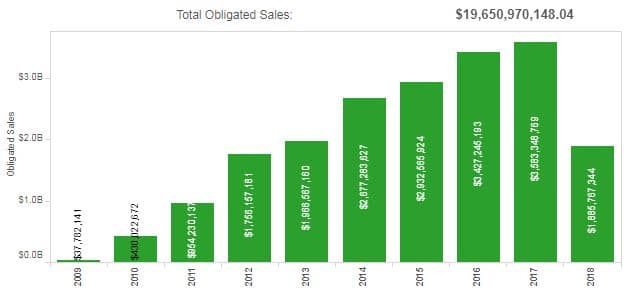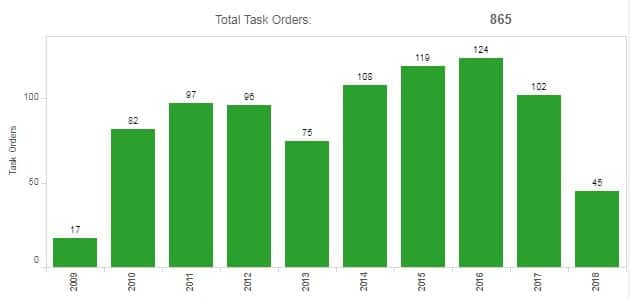

A vendor received no help from the district court after it dismissed the case of whether GAO must comply with the Administrative Procedures Act.
Best listening experience is on Chrome, Firefox or Safari. Subscribe to Federal Drive’s daily audio interviews on Apple Podcasts or PodcastOne.
The Government Accountability Office still is not required to follow the Administrative Procedures Act.
The General Services Administration’s next great IT services governmentwide acquisition contract finally is through the protest gauntlet and soon will be ready for use. And the Treasury Department makes a surprising decision about the future of one of its multi-billion dollar multiple-award IT contracts on the heels of GSA getting the go-ahead for its contract.
These three events are part of a busy last several weeks in the federal acquisition community.
Federal procurement experts say the U.S. District Court’s decision that GAO continues to be exempt from the APA isn’t surprising. The act waives sovereign immunity only with respect to suits seeking relief other than money damages and challenging the action or inaction of an “agency.”
The court said GAO is not an “agency” by the definition in the law since it’s part of the legislative branch.
Rob Burton, an attorney with Crowell & Moring and a former deputy administrator in the Office of Federal Procurement Policy, said the district court’s decision reinforces that GAO is a unique entity and the rules governing it are dissimilar than any other.
“We who work with GAO regularly know it’s not part of executive branch and the rules that apply to the executive branch do not always apply to legislative branch,” he said. “But it’s fairly rare to have a disagreement with GAO over redactions to public protest decisions. Most of time GAO is pretty good about it and have never seen them act in arbitrary way.”
The case the U.S. District Court said it didn’t have jurisdiction to rule on was from Pond Constructors, which was unhappy with GAO’s decision to publish a protest decision information that Pond says is commercially confidential, including bottom-line prices, adjectival ratings and past performance information.
“Pond alleges that GAO’s refusal to redact this information from the decision is arbitrary and capricious in violation of the Administrative Procedure Act,” the court states.
Bill Shook, a long-time procurement attorney, said the decision reinforces a major hole in the federal acquisition system — vendors have no recourse if GAO rules against them.
“I’ve always complained that GAO has no procedures for appeal on decisions made by an attorney. Redactions are a perfect example of where I believe data has a commercial valuable under the Trade Secrets Act and there isn’t anything you can do to stop them from publishing it,” he said. “If GAO says no to your request, there is no review of that decision except for Congress and that’s not going to be successful.”
Shook said he just had a recent situation with a client in which they were concerned if their proprietary information was made public, they would lose what they see is a competitive advantage over their competition.
“If GAO decides to put out that data and their competitors can use that same process and my client loses those trade secrets,” he said. “You are relying upon the reasonableness of the GAO attorney. I got some of that information redacted, but not all of it.”
On the other hand, Shook said if a vendor submits a protest to the Court of Federal Claims and a judge makes a decision about redactions that the parties don’t agree on, there is an appeals process to higher court.
Burton added any attorney has to view their relationship with GAO as a partnership and not an adversarial relationship.
“You have to be persuasive in the fact that the information is proprietary and would hurt company if released. Sometimes that argument is hard to make,” he said. “Generally, people abide by the protective order and I’ve never seen a lot of proprietary information releases by counsel. It just doesn’t happen as general rule.”
GSA also came out on top of a recent bid protest decision. Four vendors submitted complaints to the Court of Federal Claims after being left off of the $50 billion Alliant 2 IT services GWAC.
GSA awarded 61 vendors a spot on the unrestricted version of Alliant 2 in November.
Several unsuccessful bidders then took their cases to federal court, which ruled in GSA’s favor in early June.
GSA announced that Alliant 2 would be ready for other agency use starting on July 1.
“The court’s decisions further solidify the validity of GSA’s innovative procurement approach, highest technically rated offerors with a fair and reasonable price,” wrote John Cavadias, the GSA Alliant 2 GWAC Procuring Contract Officer in the IT Services Contract Operations Division at the Federal Acquisition Service, in a blog post on GSA’s Interact site.
GSA said when it made the initial awards that Alliant 2 would be a key piece of the Trump administration’s IT modernization effort.
GSA made several changes to Alliant 2 from the initial contract awarded in 2009 including:
The original Alliant contract has been popular with agencies, receiving 865 task orders worth more than $19 billion over the past 10 years.

The Army, Air Force, the Defense Department and the Homeland Security Department were the biggest users of Alliant by total obligations, while SAIC, Booz Allen Hamilton and Leidos were among the biggest winners among vendors by total sales.

On the heels of GSA’s win in court, Treasury decided not to recompete its large IT services contract known at TIPSS 4. Instead, the agency will let it expire in December and move all work to other governmentwide contracts.
“We, along with all other government procurement offices, have been mandated to acquire needed services and supplies from already established governmentwide and designated ‘Best-in-Class’ vehicles. Therefore, we are transitioning all current and future projects to GSA Schedule 70, GSA Alliant and/or Alliant-SB and other vehicles as we see appropriate,” the IRS writes on the TIPSS 4 website.
The IRS awarded the TIPSS 4 contract in 2010 to 33 vendors. It had a ceiling of $4 billion.
Bloomberg Government, which first reported the IRS’ decision, said the TIPSS-4 unrestricted and the TIPSS-4 small business have generated $3.8 billion in spending obligations since 2011. Bloomberg says 63 companies have won task orders under the contract, led by Deloitte Touche ($688 million), Booz-Allen Hamilton ($586 million), Northrop Grumman Corp. ($525 million) and IBM Corp. ($467 million).
The IRS’ decision not to renew TIPSS is a big deal given how popular it is compared to some of the BIC vehicles, where Bloomberg Government reported Treasury spent a combined $232 million on these vehicles since 2010.
OFPP is pushing agencies to reduce duplicative contracts by 13 percent by 2020 under the category management initiative. This is among the first major wins for that effort.
OFPP currently says there are 32 contracts determined to be best-in-class.
Bloomberg Government also reported in 2017 that the number of multiple award contracts dropped by 239 over the last five years, while spending continues to increase to over $111 billion a year.
Another potential win to look out for is the DHS Eagle 3 acquisition.
Soraya Correa, DHS’ chief procurement officer, said at a recent industry day sponsored by Washington Technology that she sees next generation contract as much different than the current one.
“Between GSA, OMB, and agencies we created this best in class procurements where they provide a lot of generic services so if there is a best in class procurement that fulfills our needs we will go to that first. We will see what they offer and see what’s out there,” Correa said. “We do have plans and are working with the DHS CIO’s office to create a follow-on to Eagle and Flash [agile procurement vehicle] and it will be a combined procurement that is more uniquely tailored to DHS’ needs around what we need to do now and in the future, and what our components needs are. It will not look exactly like Eagle 2. It will probably be pretty different.”
Correa said she envisions the same thing for the DHS First Source IT products contract as well.
The DHS IT Category management council, made up of staff from the CIO and CPO offices, are identifying what things the agency needs to work on, including assessing current best-in-class vehicles and talking about requirements the agency needs for the future.
Correa gave no specific timeline for Eagle 3, but the current contract expires in 2020 so acquisition planning is underway.
Copyright © 2025 Federal News Network. All rights reserved. This website is not intended for users located within the European Economic Area.
Jason Miller is executive editor of Federal News Network and directs news coverage on the people, policy and programs of the federal government.
Follow @jmillerWFED




